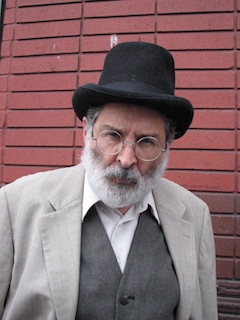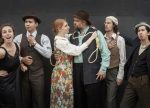Left to right: Ariel Martz-Oberlander (Dolly), Damon Jang (Walt Dreary), Katie Purych (Polly Peachum), Kevin Armstrong (Macheath), zi paris (Bob the Saw) and Adam Olgui (Street Singer). (photo by Colin Beiers)
The Threepenny Opera “has a grassroots design to it and deals with action and issues that are often seen in the streets and politics of major cities throughout the world,” Theatre in the Raw artistic director Jay Hamburger told the Independent. “The play for sure is original and it takes a lot of risks that, if given thought, speak profoundly to today.”
Indeed, violence, poverty, oppression and inequality are not things of the past. And Bertolt Brecht and Kurt Weill’s 1928 musical – itself very closely adapted from The Beggar’s Opera, written 200 years earlier, by John Gay with music arranged by Johann Christoph Pepusch – remains both entertaining and thought-provoking. The Theatre in the Raw production of it Nov. 16-27 at the Russian Hall is to be highly anticipated.
“Theatre in the Raw has always strived to provide high-quality performance work,” said Hamburger. “Though the productions can seem minimalist, a theatrical experience is aimed for and often with a message. The Threepenny Opera play, and the Beggar’s Opera that it was based on, inverted the notion of theatre experiences as gaudy, excessive and out of reach of the common person, and instead focused on the underbelly of society. Brecht’s approach to theatre championed breaking down walls between audience and actor, turning the notion of passive viewer of entertainment on its head. These ideas are much in line with Theatre in the Raw’s ambitions and desire to reach out to audiences in profound and innovative ways. Plus, providing a play of this scale with a relatively large cast and crew allows Theatre in the Raw to not only put on the show for the community … but also to have many talented artists perform their craft on stage.”
Among those artists are a few from the Jewish community. Stephen Aberle plays the central figure of Mr. Peachum.
“I play Jonathan Jeremiah Peachum, owner and proprietor of the Beggar’s Big Brother, an outfitting and licensing company for all the beggars in the city,” Aberle explained. “Peachum has a monopoly, strictly enforced: anyone caught begging in his territory without a licence gets beaten up; second offenders get ‘the saw.’ His ‘clients’ must pay for their licences with hefty initiation fees, and by turning over half (or more) of their take.
“He’s a crucial plot engine: his daughter Polly marries the hero/antihero Macheath, leaving Peachum outraged. His obsessive struggle for revenge drives much of the action of the play.”
Set in London’s Soho just before Queen Victoria’s coronation, Peachum tries to have Macheath – also a brutal criminal, aka “Mack the Knife” – arrested and hanged, but the police chief happens to be an old army buddy of Macheath’s. Peachum, however, uses his influence and Macheath becomes a wanted man. Polly warns her lover, but, before fleeing, he stops in at the brothel he frequents.
“My character is Dolly, one of the whores who live with Jenny Diver in Wapping,” said Ariel Martz-Oberlander. “Macheath visits them every week and it’s them he goes to see instead of escaping from the police when he gets a chance.”
Adam Olgui plays the Street Singer, who is, in a way, “the narrator of the story,” said Olgui. “Although he’s an observer, he slips in at times to assume different roles to help move the plot along. The Street Singer himself is a smooth, playful, light-hearted being.”
As Brecht adapted Gay’s work, changing the setting, for example, to Victorian England, and highwaymen into gangsters of a sort, Theatre in the Raw will also add its touch.
“We are introducing elements modernizing the style of the characters, their wardrobes, etc., and are not doing the play using English accents,” said Hamburger. “Though the play technically still occurs in an alternate version of 19th-century Soho, we feel our stylistic choices help the piece reflect more universally about the 1920s Germany where it was written and possibly on our pressing modern situations as well. We’ll admit we’re putting a bit of Commercial Drive flavor into it, too, as the play involves a diverse group of characters that are both fun and standout.”
And the characters still speak to us.

“To my mind, the character of Peachum remains bitingly, bitterly relevant today,” said Aberle. “He is Brecht’s critique of capitalism par excellence, a ‘businessman’ whose business, like so many winning enterprises, thrives on human misery. As he observes, ‘The powerful of the earth can create poverty, but they can’t bear to look at it.’ He has learned to profit by this discovery, and has no scruples about doing so – by whatever means necessary.
“Peachum is cynically fond of religious references. He loves to preach, usually (like his middle namesake) to gloomily pessimistic effect (‘the world is mean, and man uncouth!’), and offers verses of scripture to persuade suckers to part with their money. This leaves me as an actor surmising that he may have had a religious education, perhaps even an earlier career as a clergyman, before stumbling into the vocation of extracting value from poverty instead of working to alleviate it. Some might find parallels with today’s professional evangelists.”
As for her character, Martz-Oberlander said, “Dolly represents the way a woman can make a living taking advantage of a very misogynistic and cut-throat society in the play. She has no misconceptions about Macheath falling in love with her and is content to use her body to make a living. She is reasonable, if very naïve. Dolly plays a small part in the story, but she stands the test of time by being a strong woman who makes her way in a system in many ways rigged against her.”
Olgui spoke more generally. “I think that the timelessness of Brecht’s themes and his view of human nature are why his works are still relevant today,” he said.
Hamburger highlighted the play’s “wild sense of humor” and its “rollercoaster” of a story. He noted that both Brecht and Weill “were extremely interested in U.S. entertainment during the early part of the 20th century. Though the play didn’t really make it in the U.S. until the 1950s, both creators looked to the U.S. for some form of success. Weill actually escaped Germany before the Holocaust, knowing he had to get out to save his life. Brecht, on the other hand, before and during the Second World War, fled to 10 different countries in order for him and his family to survive. The play speaks in an extremely original and relevant way to a lot of concerns that face us economically, socially, and the gap between the rich, the middle-class and the poor, and how certain people are often at a disadvantage and seeking ways to survive.”
Not to mention it has some pretty catchy and enduring tunes: “Ballad of Mack the Knife” and “Jenny the Pirate,” to name but two.
Tickets for The Threepenny Opera are $25 and $20 (students) and available at the door or from theatreintheraw.ca/tickets.

